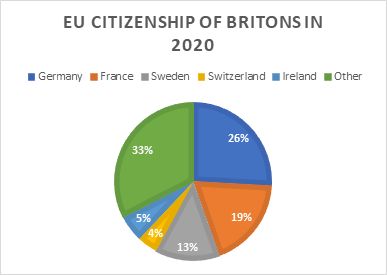The rules have changed after Brexit
As of January 1st, 2021, the UK was no longer a member of the European Union (EU). The result of Brexit ended not only 47 years of UK membership with the EU, but also changed the system of UK outbound migration. Put simply, Brexit has changed the way British citizens live and work outside their country, especially in the EU.
Under the terms of the Withdrawal Agreement, the freedom of movement policy became invalid on December 31st, 2020. For UK nationals living in an EU country prior to Brexit and are staying there afterward, they still have residence rights in such country, but not the rest of the EU. Following December 31st, 2020, UK citizens can travel to the EU for up to 90 days without a visa as short-term visitors. With the exception of Ireland, if UK citizens intend to live and work in the EU, they need to apply in accordance with that country's existing immigration rules and make sure that their professional qualifications are recognized in the EU as well.
British nationals obtained EU citizenships
According to the data of the Office for National Statistics (ONS), over 200,000 citizens from EU countries left the United Kingdom in 2020, marking a significant decrease from 3.7 million in 2019 to 3.5 million in 2020. It is claimed that this is one of the consequences of Brexit and the Coronavirus pandemic.
On the other hand, the strong bond between the UK and 27-nation-bloc remains. In 2019, there were around 1.3 million Britons who lived in the EU countries. Then, in order to meet requirements of post-Brexit, as of June 2021, 435,000 UK citizens applied for permanent residence in EU countries, with 274,000 approved.
British nationals were and are still seeking for a second nationality in an EU country. In 2020, 16,600 British nationals were granted their EU citizenship , which is more than six times higher than the figure of 2015 – the year UK voted for Brexit. Germany, France, and Sweden are the countries that issued the most citizenships to Britons in the EU. Those three countries accounted for about 60% of citizenships issued, with other EU countries accounting for the remaining 40%.

As mentioned above, since January 1st, 2021, UK citizens no longer have access to European rights, which makes them eligible to apply for EU residency and citizenship by investment ("RCBI") programs. And there are multiple options that deserve your attention, such as, Irish Residence Permit Investor, Golden Portugal Visa, France SUV, Spain Golden Visa, etc.
The present article only touches upon some of the options
available, but there are plenty more. Trusted lawyers will be able to advise the
options most suitable to your circumstances and goals.
If you are interested in any RCBI program in EU or other countries, visit here for more details.
Summary
The entire immigration journey, whether to be in a Residency by Investment or Citizenship by Investment program, takes a significant amount of time, resources, and focus over an extended period.
Most people may find it challenging to navigate through the entire procedure. Working with a professional immigration lawyer with a government-appointed immigration firm only improves your chances of successfully completing the process and approval, but it also protects you from any kind of immigration frauds.
The content of this article is intended to provide a general guide to the subject matter. Specialist advice should be sought about your specific circumstances.


